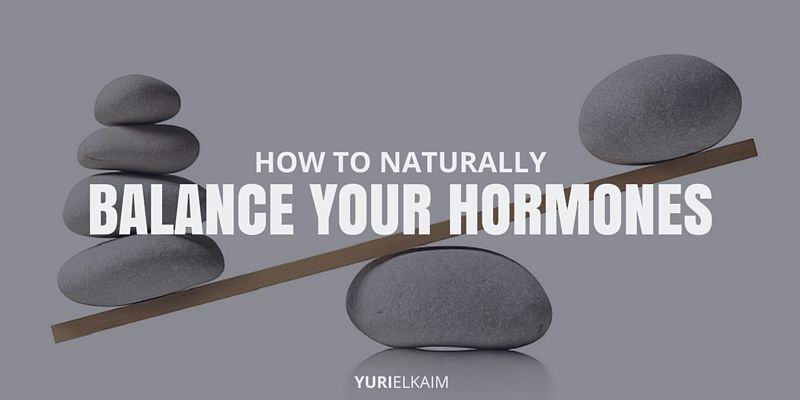Feeling bloated, foggy, drained, anxious or depressed? Gaining weight around the belly?
In this article
Chances are your hormones are trying to tell you something.
Hormones don’t just make teenagers moody and cause hot flashes in women. They affect nearly every function in your body: man, woman, child, and teenager.
When they get out of whack, they can scream for attention. And that’s the time to consider balancing your hormones – naturally – to get things back in line.
Hormones control your metabolism (read: whether you gain or lose weight) to your digestive function (whether or not you poop everyday). Hormones even allow you to grow from a baby to an adult.
Sure, hormones do have unfortunate association with moodiness – they contribute to mood regulation, for sure – but without hormones there wouldn’t be life here on earth.
Hormones are an extraordinarily complex topic, and the details of how they work obviously can’t be summed up in one blog post.
However, I’m going to give you a brief 101 on hormones, so by the time you’re done reading this blog post you’ll understand the basics of naturally balancing your hormones.
Hormones 101
We’re still not sure exactly how many hormones there are in our bodies but some estimate there are at least 50 different classes.
Their job is to serve as chemical messengers, communicating with each other to perform specific functions.
Hormones are produced in several glands, including your
- Reproductive organs
- Pineal gland
- Pancreas
- Thyroid
- Pituitary, and
- Adrenal glands
All of these glands help regulate your metabolism, sleep cycle, energy production, and stress response.
Meanwhile, gastrointestinal hormones are produced in your gut. In fact, more than 30 known hormones are produced there, which makes the gut one of your body’s largest hormone producers (1).
What Hormones Do
Each of your hormones has its own unique job to do, but each hormone depends on information that’s communicated to it from other hormones in order to carry out its tasks.
For example, let’s take a look at the thyroid hormone T3.
T3 is produced by your thyroid gland to regulate your metabolism and convert food into energy. But for the thyroid to know exactly when it needs to produce T3, it must receive proper communication from your hypothalamus – a gland that receives feedback about various things your body does.
For instance, when your hypothalamus receives the feedback that you’ve eaten a meal, it takes a look to see if there’s enough T3 in your bloodstream to metabolize it. If there isn’t, the hypothalamus will initiate a complex biochemical reaction to ensure your thyroid produces more T3 by releasing the hormone TRH (thyrotropin-releasing hormone).
Once released, TRH signals to your pituitary gland to release the hormone TSH (thyroid-stimulating hormone). TSH will then tell the thyroid to release more T3 and T4 into the bloodstream to metabolize the meal you just ate (2).
Whew! That’s quite the process, isn’t it?
[Related: Not Losing Weight? Low Thyroid Might Be Why]
And with that being only one example of several chemical reactions that take place in your body each day, you can see how complex your hormonal balance can become.
In fact, I read a metaphor the other day that perfectly sums up the codependent relationship between hormones. Think of the endocrine system (which governs your hormones) as a spiderweb. You can’t touch a single strand without affecting the function of every gland.
As you can guess, when communication gets confused between hormones (and we’ll talk about how that happens in a moment), it impairs their ability to function properly. And that’s when symptoms of hormone imbalance can result.
What Are the Signs of Hormone Imbalance?
Hormone imbalance symptoms can be stubborn to get rid of, especially if you’re not sure which hormones are affected most.
The good news is that because hormones work so closely together, once you begin to use natural remedies to balance hormones, it helps all of your hormones.
That means once you start incorporating natural remedies for hormone balance into your lifestyle, there’s a good chance you can help ease several symptoms at once.
The list of symptoms of hormone imbalance is broad, and that’s because your hormones control so many different functions.
Plus, our age and lifestyle can play a huge role. For example, women entering menopause in their 50’s tend to experience hot flashes due to fluctuating estrogen levels (3). Meanwhile, teens are more likely to suffer emotional distress because of the increased secretions of sex hormones in adolescence (4).
Not only that, but there are general symptoms of hormone imbalance that can occur at any age.
Many of the symptoms below are often seen together, which is supported by the fact that all hormones work interconnectedly.
Common symptoms of hormone imbalance at any life stage include:
- Bloating
- Midsection weight gain, despite eating healthy and exercising
- Acne, especially around the chin, mouth and jawline
- Fatigue, despite sleeping 7-8 hours each night
- Irritability
- Depression
- Anxiety
- Sugar cravings
- Constipation
- Abdominal cramping
- Painful periods
- PMS symptoms: cravings, depression, irritability, breast tenderness
- Frequent headaches
Have you experienced any of these symptoms? Perhaps you’re battling a few of them right now.
Luckily, by understanding the root causes of hormone imbalance, you can begin incorporating natural remedies to help resolve your symptoms once and for all.
Let’s take a look at some of most common causes.
Why Stress Imbalances Hormones
If there’s one lifestyle factor that can ruffle up your hormones, it’s stress.
And as you well know, today’s hectic lifestyle forces us to be exposed to stress on a regular basis.
It’s true that your body is equipped to handle moderate amounts of stress, thanks to the primary stress regulating hormones cortisol and adrenaline.
But when the level of a couple hormones is continually high, an imbalance between the rest of your hormones can result. That’s why when cortisol is constantly being released into your bloodstream as a response to stress, it can upset the balance between the rest of your hormones (5).
Having high levels of cortisol is never a good thing. Not only does it suggest your adrenal glands are being exhausted (they produce stress hormones), but it continually sends signals to your body that you’re in danger.
Long-term, this can create a cascade of undesirable hormonal symptoms. If you’ve ever heard the saying “stress makes you fat,” it’s because of the repeated release of cortisol.
Additional Hormone Balancers
For even more hormone-balancing help, some herbs – like maca root and burdock root – are considered effective natural remedies.
That being said, since the cause of hormone imbalance can be different for each person, I recommend consulting a qualified healthcare practitioner before adding a new supplement to your diet. Checking with your provider will also help best determine which herbs are the most helpful for your symptoms.
Your naturopathic doctor or gynecologist can test for hormone imbalances through blood tests, hair follicle (or FSH) tests, and your saliva.
The average cost of getting your hormones tested can vary, but is usually within the $300-$400 range. These cost of the tests can even be covered by some health insurance companies.
Happy Hormones, Happy Body
As you can see, there are many safe and effective natural remedies you can start incorporating right away to promote hormone balance.
Since hormones are directly involved in how you feel on a day to day basis, the benefits of balancing hormones naturally are endless.
Not only can you expect to have natural energy that lasts longer, but you can also experience clearer skin, improved digestion and a greater sense of well-being overall.
Want My Best Home Remedies?
Get the 10 go-to natural remedies I use at home to keep me and my family healthy (and drug-free) – for FREE! You can download them right now by clicking the banner below.


